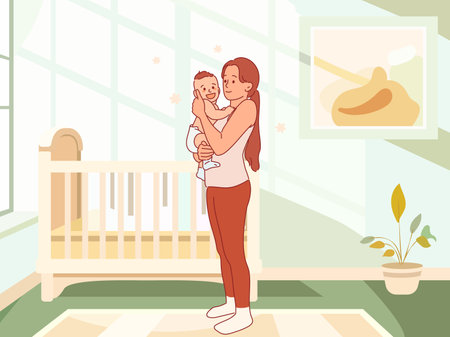Understanding Postnatal Depression in the UK Context
Postnatal depression (PND) is a significant mental health concern affecting many families across the UK. Unlike the ‘baby blues’—which typically resolve within two weeks of childbirth—postnatal depression can persist for months and deeply influence both the parent and wider family dynamics. Recent studies indicate that approximately 1 in 10 women in the UK experience PND, though experts believe this figure may be underestimated due to stigma and underreporting. Importantly, fathers and partners are also at risk, with around 1 in 20 men reported to develop symptoms of postnatal depression.
Prevalence and Symptoms
| Group | Estimated Prevalence in the UK |
|---|---|
| Mothers | 10-15% |
| Fathers/Partners | 5-10% |
The symptoms of postnatal depression vary but often include persistent sadness, loss of interest in everyday activities, fatigue, changes in appetite or sleep patterns, difficulty bonding with the baby, and feelings of worthlessness or guilt. These experiences can make day-to-day parenting extremely challenging and may strain relationships within the family unit.
Specific Risk Factors Among UK Families
UK families face unique risk factors for PND, shaped by social and economic circumstances. Socio-economic deprivation—such as low income, unemployment, insecure housing, or limited access to childcare—can increase vulnerability to postnatal depression. Additionally, recent immigrants or those without strong local support networks may feel isolated or struggle to access culturally appropriate services.
NHS Support Frameworks
The National Health Service (NHS) offers structured support pathways for families affected by PND. Health visitors play a vital role in early identification through routine postnatal check-ups, while GPs can refer parents for talking therapies or prescribe medication when needed. Specialist perinatal mental health teams provide targeted interventions for those with more severe symptoms. However, access and quality of services may differ across regions, making it crucial for families to understand their local options.
Socio-Economic Influences & NHS Resources Overview
| Risk Factor | NHS Response/Support Available |
|---|---|
| Low Income/Unemployment | Access to counselling and financial advice services |
| Lack of Social Support | Referral to peer support groups and community resources |
| Cultural/Linguistic Barriers | Bilingual health visitors; interpretation services |
This multi-layered approach helps ensure families receive timely assistance tailored to their circumstances—a key aspect in supporting parental mental health and nurturing healthy family relationships from the earliest days of a child’s life.
2. Emotional Wellbeing of Parents and Infants
Postnatal depression (PND) casts a significant shadow over the emotional wellbeing of both parents and infants, particularly in the context of British family life. From a psychological development standpoint, the early months are crucial for nurturing secure attachment and establishing a strong parent-child bond. When a parent, most often the mother but sometimes the father as well, is affected by PND, their capacity to respond sensitively to their baby’s cues may be compromised. This can influence not only the infant’s immediate sense of security but also their long-term emotional regulation and social skills.
Attachment and Bonding in UK Families
In many UK households, the transition to parenthood is accompanied by high expectations around bonding. However, when PND enters the picture, this natural process can be disrupted. Infants may pick up on parental distress, leading to increased fussiness or withdrawal, while parents struggling with low mood may find it hard to engage in joyful interactions such as singing nursery rhymes or sharing cuddles—activities so central to British parenting culture.
Emotional Development: Psychological Insights
| Aspect | Impact of PND | Typical UK Family Experience |
|---|---|---|
| Attachment Style | May develop insecure attachment due to inconsistent parental responses | Secure attachment typically encouraged through responsive caregiving |
| Infant Emotional Regulation | Difficulties self-soothing; higher risk of anxiety in later childhood | Parents usually provide verbal comfort and physical affection |
| Parent-Child Bond | Bond may feel strained or distant, affecting both parties’ confidence | Cultural emphasis on close-knit relationships and open communication |
Understanding the Ripple Effect
The ripple effect of postnatal depression extends beyond individual distress. Siblings, grandparents, and even wider support networks within communities across England, Scotland, Wales, and Northern Ireland may notice changes in family dynamics. Recognising these psychological impacts is essential for early intervention and fostering environments where both parent and child can thrive emotionally.

3. Impacts on Partner Relationships
Postnatal depression (PND) does not solely affect the individual experiencing it; its influence often extends to the partner, altering the dynamics of British households in significant ways. The emotional and psychological strain can manifest as reduced communication, diminished intimacy, and challenges in maintaining mutual support. In the UK context, where there can be a cultural tendency to keep a “stiff upper lip” and avoid discussing mental health openly, these challenges may become even more pronounced.
Communication Challenges
One of the first areas affected by postnatal depression is communication between partners. Feelings of sadness, irritability, or withdrawal may lead to misunderstandings or silence. Partners might feel helpless or unsure about how to offer support, especially if they are unfamiliar with the signs and symptoms of PND. This can create a cycle where both individuals feel isolated and misunderstood.
Intimacy and Emotional Closeness
Intimacy, both physical and emotional, often suffers when one partner is coping with PND. Exhaustion, low mood, and anxiety can reduce libido and emotional availability. For many British couples, this shift can be distressing, especially if there are expectations around maintaining closeness after welcoming a new baby. It is not uncommon for couples to experience a temporary loss of connection during this period.
Common Strains on Relationships in UK Households
| Area of Relationship | Possible Impact of PND |
|---|---|
| Communication | Increased misunderstandings, reluctance to talk about feelings |
| Intimacy | Reduced physical affection and emotional closeness |
| Mutual Support | Feelings of isolation or being unsupported by each other |
The Importance of Mutual Support
A crucial aspect of navigating postnatal depression is fostering mutual support within the partnership. However, British partners may sometimes struggle to express vulnerability or ask for help due to societal expectations or personal upbringing. Without open dialogue and shared coping strategies, both parents can feel overwhelmed, potentially impacting their ability to provide a nurturing environment for their child.
Navigating Relationship Changes Together
Recognising that these changes are common and seeking help—whether through local NHS resources, counselling services, or peer support groups—can make a significant difference. Open conversations about mental health and parenting challenges help reduce stigma and pave the way for healing within the family unit.
4. Family Dynamics and Extended Support Networks
In the UK, family dynamics are shaped not only by immediate household members but also by the broader web of support that includes grandparents, friends, and the wider community. When postnatal depression (PND) affects a parent, these extended networks often play a pivotal role in recognising early signs and offering practical and emotional support. In British culture, the involvement of grandparents is particularly significant—many families rely on them for childcare, advice, and a comforting presence during challenging times. Friends, too, serve as vital sounding boards and sources of encouragement, especially in communities where social isolation can exacerbate mental health struggles.
The Role of Grandparents
Grandparents often provide stability and continuity within the family unit. Their experience can help identify changes in mood or behaviour that may indicate PND. However, intergenerational differences in understanding mental health can sometimes lead to misunderstandings or hesitation in seeking professional help.
Support from Friends
British friendships tend to be valued for their loyalty and discretion. Friends might notice subtle shifts in a new parents demeanour or energy levels and may offer gentle encouragement to seek support. The tradition of meeting over a cup of tea or a walk in the park provides informal yet important opportunities for open conversation.
Community Resources
The UK is home to many community-based initiatives designed to support families facing PND. Health visitors, local parenting groups, and charities such as Mind or the National Childbirth Trust (NCT) play crucial roles in providing information and assistance. Accessing these resources can help reduce feelings of isolation and promote recovery.
| Support Network | Role in Recognising PND | Typical UK Example |
|---|---|---|
| Grandparents | Observing changes; providing hands-on help | Picking up grandchildren from nursery; offering meals |
| Friends | Emotional support; encouraging professional help | Coffee mornings; WhatsApp group chats |
| Community Organisations | Offering structured support; signposting services | NCT groups; local baby clinics |
Ultimately, the strength of these interconnected support systems can determine how effectively families navigate the challenges of postnatal depression. Encouraging open dialogue across generations and within local communities helps build resilience and fosters a more compassionate response to PND in the UK context.
5. Barriers to Seeking Help and Stigma in the UK
While postnatal depression (PND) is now more widely recognised in the UK, many families still encounter considerable obstacles when seeking mental health support. These barriers are often rooted in cultural attitudes, social expectations, and systemic issues within the British healthcare system. Understanding these challenges is vital for parents, caregivers, and professionals who aim to foster healthier family dynamics and promote early intervention.
Cultural Attitudes and Social Stigma
In many British communities, there remains a persistent stigma surrounding mental health, particularly in relation to parenthood. The expectation that new parents, especially mothers, should feel nothing but joy after childbirth can make it difficult for individuals experiencing PND to admit their struggles. This “stiff upper lip” mentality may discourage open conversations about emotional well-being, leaving many feeling isolated or ashamed.
Common Stigmas Associated with PND in the UK
| Stigma | Impact on Families |
|---|---|
| Perceived Parental Inadequacy | Fear of being judged as a ‘bad parent’ or unfit caregiver |
| Concerns About Child Removal | Anxiety that seeking help might result in social services intervention |
| Mental Health Taboo | Reluctance to discuss emotional struggles openly within family or community |
Regional Disparities in Accessing Support
The availability and quality of mental health services can vary significantly across different regions of the UK. While some urban centres offer specialised perinatal mental health teams and accessible talking therapies, families living in rural areas or deprived communities may face long waiting lists, limited resources, or even a lack of local services altogether.
Regional Comparison: Access to Postnatal Mental Health Services
| Region | Service Availability |
|---|---|
| London & Major Cities | Wide range of NHS and voluntary sector support; shorter waiting times |
| Northern England & Scotland | Patchy provision; greater reliance on GP referrals; longer waits possible |
| Rural Areas & Small Towns | Fewer specialist services; travel required; potential digital access barriers |
Systemic Challenges Within Healthcare Pathways
The structure of the NHS itself can unintentionally create further hurdles. Some parents report difficulty navigating referral systems, encountering inconsistent screening for PND during postnatal check-ups, or not being offered culturally sensitive care. For fathers and partners, support options are even more limited, despite growing recognition of their own mental health needs following the birth of a child.
Towards Greater Openness and Support
Tackling these barriers requires a multi-faceted approach: fostering public awareness campaigns that normalise seeking help, improving training for healthcare professionals across all regions, and ensuring equitable access to services for every family—regardless of postcode or background. By addressing both stigma and structural gaps, British society can better support families navigating the complexities of postnatal depression together.
6. Pathways to Recovery and Resilience
Recovering from postnatal depression (PND) is a journey that involves both the individual and their family. In the UK, there are a variety of evidence-based support options available through the NHS and local community organisations, providing families with practical guidance, emotional support, and access to mental health services. Understanding these pathways can empower families to seek help early and foster resilience together.
NHS Support Options
| Support Option | Description | How to Access |
|---|---|---|
| GP Consultation | Initial assessment, advice, and referrals for mental health support | Book an appointment at your local surgery |
| Health Visitor Service | Regular home visits, emotional support, and parenting advice | Automatically provided post-birth or via referral |
| IAPT (Improving Access to Psychological Therapies) | Free psychological therapies such as CBT and counselling | Self-referral online or through GP |
| Perinatal Mental Health Teams | Specialised care for complex cases including mother-baby units | Referral by GP or health visitor |
Community-Based Resources
- NCT (National Childbirth Trust): Offers peer support groups and courses for new parents.
- PANDAS Foundation: Provides helplines and online communities for those affected by perinatal mental illness.
- MIND: Delivers mental health information and local support services across the UK.
Fostering Resilience Within Families
Building resilience is vital for recovery and long-term wellbeing. Here are some strategies supported by research and widely encouraged within UK healthcare:
- Open Communication: Encourage honest conversations about feelings within the family, reducing stigma around mental health.
- Routine and Self-Care: Establishing daily routines can provide structure; prioritising sleep, nutrition, and gentle exercise supports both mind and body.
- Family Involvement: Involving partners and extended family in care plans promotes understanding and shared responsibility.
The Role of Social Connections
Cultivating relationships with other parents—through baby groups or community meet-ups—can alleviate isolation. Local children’s centres often host free parent-and-baby sessions that nurture positive interactions between parents and children while offering a supportive network.
Towards Positive Outcomes
The journey through PND is unique for every family. With accessible NHS services, active community support, and a focus on open dialogue and self-compassion, families in the UK can not only recover but also emerge stronger. By recognising early signs, seeking help without hesitation, and fostering resilience, it is possible to build a nurturing environment where both parent and child can thrive.


